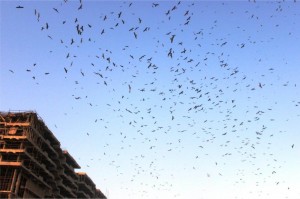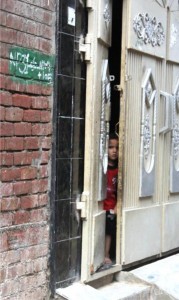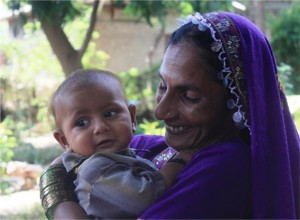Lost for Words…
Edward Mortimer is spending 10 months in Pakistan studying the Urdu language. Here he recollects his first visit to the commercial capital, the megacity of Karachi.
To this day I have never seen so many people.
Karachi choked and spluttered under the weight of her traffic, pandemonium personified. Men, women and children (but mostly men) from all walks of life thronged the dusty streets, buying, selling, drinking chai; trade seemed to be happening everywhere I looked. There was something almost mediaeval about the place; a busy port city standing guard on the Arabian Sea, bringing in commodities from places too far away to mention.
Each building had its own individual charm; dilapidated shops protruded outwards into the street, electrical cables hung dangerously low above my head, makeshift washing lines. I meandered through a labyrinthine bazar that exclusively sold electrical appliances, and after that an entire thoroughfare dedicated to the sale of wristwatches, each vendor competing with the man next door selling exactly the same thing. I wondered how each shop got enough business to stay afloat, until I remembered that Karachi had a population approaching 20 million, making it one of the largest urban agglomerations in the World. That’s 10 million wrists needing to tell the time. The few ‘Western’ establishments in the city seemed out of place, an armed guard stood outside Pizza Hut in the hope of putting prospective customers at ease. Sometimes it took 5 minutes to cross a single road, due to the density and speed of oncoming cars, motorbikes, and donkeys. It seems even the most submissive Pakistani throws caution to the wind the moment they get behind the wheel.
Walking up the pockmarked steps of the Empress Market, I hardly knew where to look. Legions of fruit sellers vied for my attention, Cats and rats darting beneath rickety vegetable carts, the air thick with flies. 
The otherworldly cries of each vendor seemed in keeping with the faded grandeur of the building, smoke rising lazily from the clock tower, its hands long frozen at precisely 11.32.
Men and women with terrible deformities manned each narrow passageway crammed with produce, the blackness of poverty juxtaposed against the ‘spilt paint pallet’ portico, a riot of colour.
I left the Market and flagged down a rickshaw. Negotiating the price of your journey is a complex business. When they see you are a gora, the rickshaw driver will assume you are completely ignorant of local prices, and will try to take you for a ride in more ways than one. Speaking Urdu, however, not only makes the process much easier, but also ensures you are not overcharged. Navigating the city by rickshaw is never boring. It is rather like being inside a hi-octane computer game, navigating the levels and obstacles, one at a time.
As dusk approached I stood and watched a dark cloud of eagles circling overhead above a half-constructed building supported by a scaffold made of sticks. I laughed at the ingenuity of the Pakistani people; such spectacles were a breath of fresh air coming from the UK, where health and safety representatives would have had an absolute field-day.
My companion informed me the birds were waiting for the butcher to throw away the entrails. During the evening I felt privileged to visit the beach and fulfill one of my lifetime ambitions: To ride a camel. Its spindly legs, bulging at the knee-joints, appeared to withstand any amount of weight placed upon them. Nevertheless I couldn’t help breathing a sigh of relief when it leaned slowly forward to let me back onto the soft sand.
Karachi never sleeps…and she doesn’t drink much either. Chronic overcrowding has made access to clean water a rare luxury for the city’s occupants. In spite of this, and any other problems you care to mention, I saw in Karachi something unique, Pakistan in microcosm.
Murree, by contrast, is somewhat cooler and more spacious. It is a small town in Northern Punjab where the Murree Language Board is based. To get there one fears for their life, dodging cars screaming down the steep mountain roads in the other direction. And yet the people here are just as hospitable, the architecture just as haphazard, and the chilies just as hot…
I have had the privilege to visit a few other places in Pakistan during my time here, and build lasting relationships with several Pakistani families along the way. Developing the confidence to speak Urdu is taking me much longer than I anticipated, but my passion for the language drives me forward. The elation you feel after understanding, and being understood, is difficult to describe. Since it is mutually intelligible with Hindi, Urdu is understood across most of the Indian Subcontinent. It also has a rich literary tradition, and draws heavily on Persian and Arabic vocabulary. Urdu’s usefulness as a regional lingua franca cannot be underestimated, and once I am a proficient speaker, my aim is to strengthen links between the UK and Pakistan through business, diplomacy and cultural exchange.
This scholarship has brought my language studies to life. It has made me realise that becoming a fluent Urdu speaker is achievable, regardless of whether it takes days, months, or years.
Needless to say, without the John Speak Trust this experience would not have been possible.




